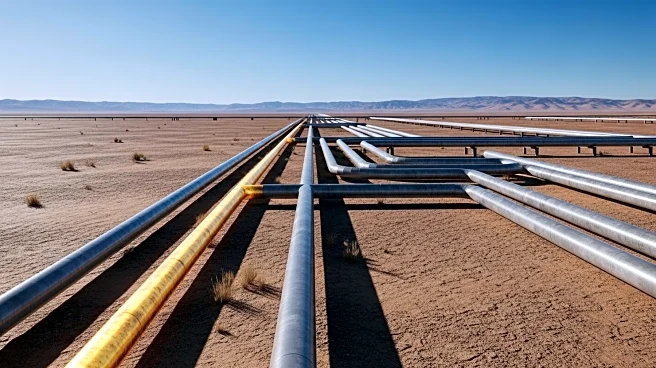What's Happening?
Chevron, a U.S.-backed oil giant, has entered into a $610 million agreement with Israel Natural Gas Lines to construct a 65-kilometer pipeline. This pipeline is designed to transport natural gas from Israel to Egypt, with an expected completion date in 2028. The project aims to carry at least 600 million cubic feet of gas per day, potentially increasing Israel's export capacity to Egypt to over 2.2 billion cubic feet per day. This initiative is part of a broader strategy to diversify Israeli gas exports, alleviate Egypt's energy crisis, and strengthen regional energy partnerships. The Leviathan gas field, one of the world's largest deep-water gas discoveries, plays a central role in this strategy. Chevron holds a significant stake in the project, alongside Israel's NewMed Energy.
Why It's Important?
The pipeline deal is significant as it underscores the growing energy collaboration between Israel and Egypt, two key players in the regional energy market. This project is expected to deliver substantial economic benefits and enhance energy security across the Eastern Mediterranean. For Israel, the deal represents a strategic move to solidify its position as a major gas exporter, while for Egypt, it offers a solution to its ongoing energy challenges. However, the geopolitical context is complex, with ongoing conflicts in the region and a recent United Nations report accusing Israel of genocide in Gaza, which Israel has dismissed. These factors add layers of risk and uncertainty to the project, potentially affecting international relations and future contracts.
What's Next?
The completion of the pipeline is anticipated by 2028, and its success will depend on the stability of regional politics and the ability of involved parties to navigate geopolitical tensions. The project may face scrutiny and potential pushback from international stakeholders concerned about the political implications of doing business with Israel amid ongoing conflicts. Additionally, the pipeline could influence future energy policies and agreements in the region, as countries seek to balance economic interests with political considerations.
Beyond the Headlines
The pipeline project highlights the intersection of energy and politics in the Middle East, where resource management often intertwines with geopolitical strategies. The deal could set a precedent for future energy collaborations in the region, potentially reshaping alliances and economic dependencies. It also raises questions about the ethical implications of energy projects in conflict zones and the responsibilities of international corporations in such contexts.









